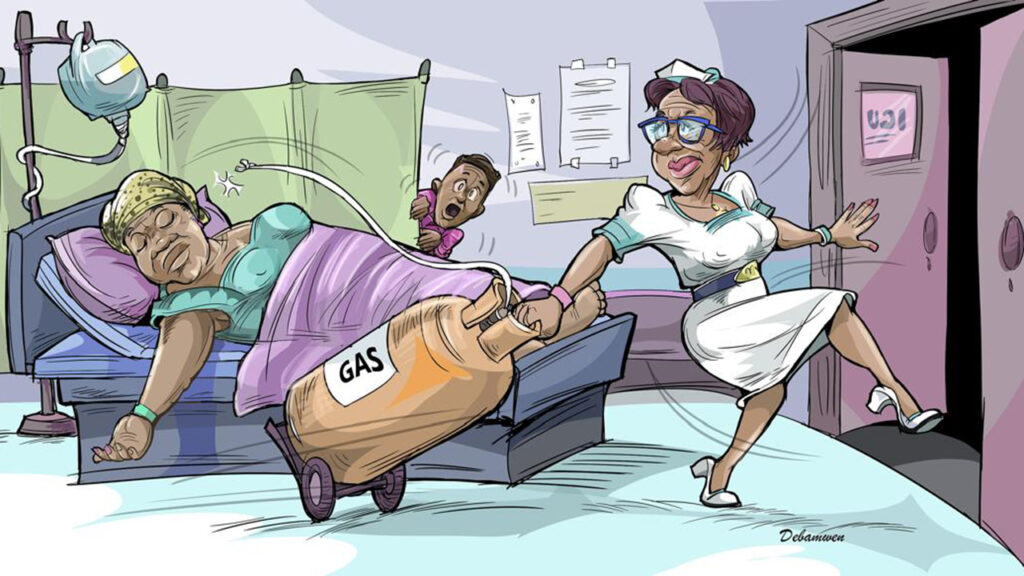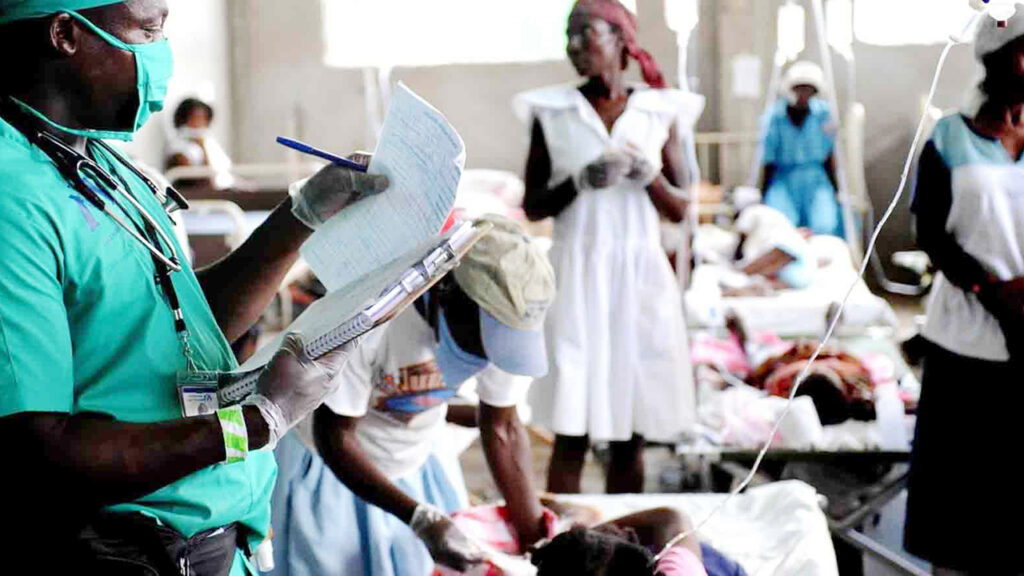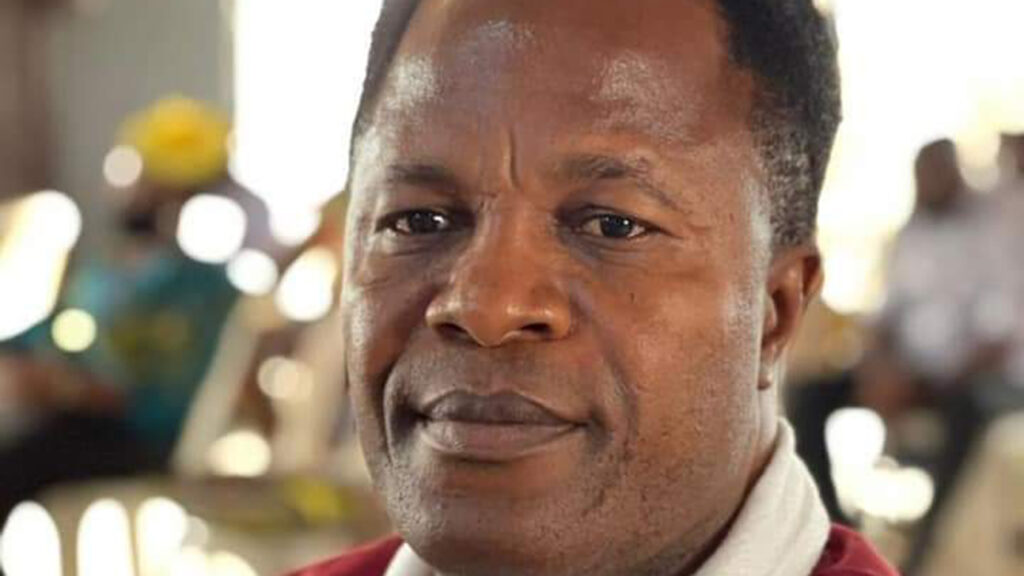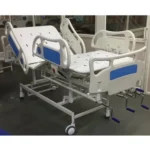
Intensive Care Units (ICUs) are supposed to be where the sick is given best treatment with empathetic care. But at the University of Port Harcourt Teaching Hospital (UPTH), reverse is the case writes ANN GODWIN.
The Intensive Care Unit (ICU) at the University of Port Harcourt Teaching Hospital (UPTH) was busy this afternoon. The wailing from patients and relatives who had lost their loved ones could be heard from far distance.
Mrs Celina, who was lying supine in the hospital bed, was unaware of the happenings around her. The faces of her two children etched with worries and fear; a fear which they dare not mention.
Celina’s son, on March 27, when The Guardian visited the hospital, watched her speechless, even when the nurses signalled to him to speak to his mum. He just stared, later muttered a silent prayer with his eyes damped in tears.
Celina’s eyelids fluttered but did not open. An oxygen machine aided her breathing, as her chest rose and fell quietly. The machine helped her from crossing the path of life and death. Sadly, this oxygen now comes at a high cost that many families cannot afford.
No thanks to the dire economic situation in the country, the hospital staff are now exploiting the patients’ ordeal. Thus, while patients’ relatives are running from pillar to post to raise money to pay for the needed oxygen, however, some of the staff exploit their situation.
Peter’s friend, John, who had been helping to pay Celina’s bills in the hospital sighed loudly and narrated to The Guardian how he handed over two oxygen cylinders to the nurse on duty for the use of Celina but received a phone call that had him spluttering in outrage as another nurse, who resumed for morning shift told him that Celina would be needing another oxygen. John registered his displeasure with the growing demand for oxygen by raising the alarm at the ward which made the nurses stare at each other.
“This would be the third cylinder in less than 24 hours each cost N10,000,” he said. Celina, a native of Afikpo, in Afikpo North Council of Ebonyi State, had developed a stroke in the first week of March after she was moved from the village to Port Harcourt to stay with his son and as a result was moved to UPTH.
Investigations by The Guardian showed that some nurses in the ICU ward see the desperate need of oxygen by patients as an opportunity to make gains unmindful of the implications on the patients.
Against the hospital rules that no medical personnel should receive any form of hospital payments into their private account according to a consultant paediatrician, who had worked in the hospital, some nurses in ICU receive payments for oxygen into their personal account.
To confirm the sad tales of patients and their relatives at the ICU ward, The Guardian, during a visit to the ward on March 27, 2024, met a calm but vibrant nurse identified as Tina, who paced in and out of the ward informing patients and their relatives of items to buy.
Pleasantries and contacts were exchanged, and, on Monday, April 1, 2024, The Guardian put a call across to Nurse Tina with telephone number 09063816253. The Guardian asked if she or any of her colleagues had any reserved oxygen for sale for a patient in the ICU ward.
Excited, the nurse requested The Guardian to call back in 10 minutes and after about 15 minutes, Nurse Tina called back and confirmed that there was a reserved cylinder for sale, stressing that it costs N10,000 for a kilogramme. She was asked to send her account details for onward transfer and the details, in the blink of an eye, at exactly 12.28pm, was sent and at 12:33:54, the sum of N10,000 was transferred to FCMB bank account number: 3557696015 with account name Okolie Tina for the oxygen payment.
In less than three minutes, Tina called, confirming receipt of the payment. She said: “Hello ma, I have seen the money, it is N10,000 for 1kg. I will give it to them (Celina’s children) now.” Peter, Celina’s son, also called at about 10:20pm the same day, to express thanks for the receipt of the oxygen for his mum.
However, under the Fraud and Abuse laws, which highlighted the six key laws that regulate the healthcare industry, care providers are not supposed to engage in acts of fraud and abuse nor issue fraudulent bills to private or government insurance providers, but some nurses like Tina in UPTH’s ICU continue to flout this law by reselling medical supplies especially, oxygen.
This distressing conduct in the hospital highlights the pains, and agonies of patients and relatives occasioned by fraudulent dealing in medical supplies as well as neglect in the ICU ward.
The wrong acts, no doubt, have devastating impact on the patients and their families. Celina who died at the hospital on April 13, spent about four weeks in the ICU ward with at least two cylinders of oxygen per day.The computation of consuming two cylinders per day within her four weeks stay in the ICU amounted to using 56 cylinders costing N560,000 for just oxygen alone.
John lamented: “First, we were asked to do a brain scan and other tests and because the machines are not installed in UPTH, we needed to leave the hospital for the diagnostic centre. However, we need an ambulance to move our mum to the centre.
“We have to pay for the ambulance, pay the nurses that followed us outside to do the test, pay the technician and pay for other numerous items.
“But our worst nightmare in this hospital is extortion by medical personnel. The nurses here make us buy for oxygen when we already had oxygen we paid for. We had two outstanding oxygen on March 26, 2024 but when we came the next day, we saw only one.
“We thought it was normal thing and bought an extra one which I handed over to a nurse at ICU on night duty, I was surprised when they called me that the oxygen had finished in the night and that they brought extra one that night.
“Even the doctors on duty were surprised over the development; they expressed shock that the patient shouldn’t consume that quantity of oxygen in one night because she is placed on a low litre, nasal cannula.
“We have been grounded by this, we are now borrowing to meet up, and even some friends and family members are assisting us to cope yet someone is extorting us.
“The economy is so bad yet people who are supposed to save life are making you spend more; it is crippling everybody in the family. It just tied us down, some other grandchildren have stopped going to school because we couldn’t cope with school fees. We came to the hospital to get help but instead, we were getting punishment. It is very painful.”
Likewise, Mr Michael, husband to 30-year-old Mrs Vivian, who had journeyed through the Accident and Emergency ward of the hospital to ICU because of breath seizure. She had spent two weeks at ICU as at March 13, 2024 when her husband narrated his harrowing experience to The Guardian at the entrance to the ward.
He said, “at the point of admission in ICU, I was mandated to buy two cylinders of oxygen, N10,000 for each, then Point of Sale (PoS) charged N200 each even when you make the normal transfer, PoS charges are inevitable so, I paid total of N20,400 for the two cylinders.
“I was also instructed to buy an oxygen head, but painfully, the oxygen I bought two hours at the Accident and Emergency ward before we were moved to ICU, I went back there immediately to get them but I couldn’t find them. I asked the nurses at the ward but they all feigned ignorance about it, so, I left in anger and prioritised my wife’s health.”

The echoes of the agonising cry of another young man simply identified as Uzoma, whose wife was admitted at the ICU just a few weeks after their wedding could be heard from the staircase to the ICU ward.
It was, indeed, rare to see a man cry in such an uncontrollable manner with tears flowing down his chin like water. Closer inquiries on that day (March 27, 2024) revealed, he had no money to buy the required oxygen prescribed for his wife.
Moved by his pathetic plight, The Guardian saw some relatives of patients contributing money for Uzoma who was unable to speak with the reporter because he was completely overwhelmed by the demands of Oxygen and the condition of his wife. A worker at the oxygen unit of UPTH confirmed that nurses steal, divert and resell patients’ oxygen as well as, drugs.
The hospital worker, who wishes to remain anonymous over fear that he might be sacked, said: “What we see here, especially from nurses in ICU is wickedness manifested in illicit practices. Oftentimes, patients will have extra oxygen like two, but the nurses will tell the relatives that the oxygen has finished and asked them to go and buy more.
“Panicking relatives who wouldn’t want to lose their loved ones will squeeze themselves to buy another cylinder of oxygen. The same thing happens to drugs.
“Doctors will tell patients relatives drugs to buy, the nurses will hide the drugs and tell their relatives the drugs has finished for them to buy another one but later they’ll resell same to the patients or other patients!”
Celina and Vivian’s relatives are not the only ones suffering from these illegal practices. More pathetic stories also abound of other dozens of patients who had suffered and continued to suffer extortions and theft at the ICU unit.
For Miss Chidima who was taking care of a75-year-old stroke patient at the ICU ward, issues of oxygen and drug missing were common.She said: “We spent one week in ICU and within that period, losses of oxygen and drugs were high. The drugs we bought went missing regularly inside the ward. Immediately you buy drugs, the nurses will direct you to drop it in the patient’s drawer and once you drop it, you will go out because the relatives are not allowed to stay beyond 10 minutes inside the ward. When the doctor who made the prescription comes to use it, you will not see the drugs again, sometimes, they will shout at you and then ask you to go and buy it again.”
Chidima further recounted: “The nurses sometimes resell the oxygen and drugs to the patients’ relatives. The second experience I had was that we bought drugs on March 26, 2024, in the afternoon and by evening when the doctor came to administer the drugs, we could not find them. We searched everywhere to no avail. But, the doctor shouted at the nurses and a few minutes later, we found the drugs mysteriously behind the hospital bed.”
The ICUs are special hospital wards that provide intensive treatments and monitoring for patients with severe or life-threatening illnesses and injuries, which require constant care and close monitoring with support equipment.
The unit is expected to be staffed with specially trained healthcare professionals with high level of empathy because almost all the patients are on life support.It is supposed to have constant electricity but sadly, it experiences power outages often, lack of functional generators and even fuel to power the generator.
In the absence of electricity, the ward remains dark, sometimes making use of solar power in the absence of electricity it is obvious that such cannot carry some certain equipment in the ward. Some of these lapses have however, led to preventable deaths.
The must-have equipment in the ICU includes ventilators, patient monitors syringe infusion pumps, defibrillators, hemodialysis machines, ultrasound machines, patient beds, feeding tubes, and glucometers among others.
Investigation showed the available equipment are grossly inadequate compared to the increasing number of patients. The study further revealed that the average ICU mortality rate reported in America ranges from eight per cent to 19 per cent or about 500 deaths yearly while in France is about 15 per cent, but in Africa precisely in Nigeria, a study in Enugu State revealed an admission rate of 153 with male to female ration of 2:1 and mortality rate of 34.6 per cent in 2015, and another study in Jos reported an overall mortality of 42.8 per cent.
The study, however, did not provide data of mortality rate of ICU in UPTH but another Scientific Research Journal of Bioscience and Medicine, in April 2023, published at scrip.org on a 365-Day record of maternal admission in ICU at UPTH, revealed that between January to December 2018, a total of 39 postnatal patients were admitted and of the figure, 19 patients died from complications of hypertensive disorders in pregnancy, sepsis and pulmonary embolism.
This data represents postnatal cases whose admission came predominantly from an unbooked labour ward.
Underhand Business In Government Facility
A MAJOR finding by The Guardian during visits to the ICU revealed that most of the consultants have their private clinics outside or close to the hospital.
Though it is clear that they have their work schedules but oftentimes, they are not usually on ground when their attention is needed considering the critical cases at the unit.
Patients may need immediate expert attention at any time, instead, house officers and anesthetists are the ones always on the ground and may not be able to take certain decisions should there be emergencies.
Narrating his ordeal at the hospital, a Port Harcourt-based pastor with Assemblies of God Mission, who simply gave his name as Pastor Emmanuel, said: “I lost my last son who was four years old here. My experience was that when my child was given a blood transfusion the percentage was not enough and because there was no higher medical authority to ascertain that the blood was not enough to direct the junior officers to give more, it resulted in a crisis that led to his death.”
He decried nonchalant attitudes, saying if there is strict supervision where defaulters are queried and sanctioned, disturbing cases of diversion, resale of medical items and neglects on patients will reduce.
“There is a nonchalant attitude to work in this hospital. Some medical personnel at ICU ward render services as if life means nothing to them not knowing that such lives matter a lot to the relatives.
“There is no monitoring or supervision. If there is a system in place monitoring what is going on here, defaulters queried and sanctioned, this nonchalant attitude would reduce.
“Perhaps, they have seen lots of deaths, so, death is no longer a big deal to them. They don’t know what the relatives of the patients are going through.”
The cleric, however, stressed the need to set up a monitoring team that will not compromise standards but ensure that the appropriate things are done and defaulters sanctioned.
Impact Of Shoddy Dealings, Negligence On Patients
The family of one Emeka Nsugec also lamented the shoddiness of the UPTH workers on the patients. Until January 21, this year, the parents of the 21-year-old, Emeka Nsuge, never imagined that their son, after a successful brain surgery at the UPTH, would die.
Nsuge, after the surgery, was moved to the ICU for more concentrated medical attention which his parents argued, he never got despite assisting in providing some essentials like fuel to power the generating set to ensure necessary equipment function to enable their first son live.
The situation was so pathetic that management could not maintain regular power and water supplies.
Relatives of admitted patients were compelled to provide funding for the necessities to avoid further health complications of their loved ones.
In the end, some of them still go home with broken heart after losing their loved ones. The father of Nsuge who spoke in confidence to The Guardian, said, “the negligence at the ICU ward is quite disturbing. One of the days when my son was still in ICU, we were outside but my instinct moved me to go inside the ward.
“When I got in, four nurses were seated and were chatting but I noticed the syringe they usually use to insert drip had pulled out from my son’s hand and blood had soaked the wrappers, bedspread and everything on the bed; even after I called the attention of the nurses to the development, it took them time before they could come and clean up the bed.”
Further observations show that the hospital generates huge funds daily as everything is paid for and despite the current economic realities, relatives of admitted patients demonstrate rare commitment to procure whatever they were requested to get just to ensure that their loved ones live.
For instance, UPTH receipt number: SC-77453 dated March 27, 2024, obtained from an ICU patient’s relative, revealed that the patient, on the said date paid N990 for creatinine, blood gas analysis (PO2, PH,1 PCO2 and Laciate N11,000, plasma Proteins 1 N1,980, plasma urea 1, N990, electrolytes N990,potassium plasma N990,sodium (na) (H), N990 and B-carbonate N990 totalling N17,930.00
Also, a Moni point PoS on March 20, 2024, obtained from the patient’s relative at the hospital indicated a payment of N10,000 for an oxygen cylinder, another moni point PoS receipt obtained from another patient’s relative on March 24, showed a payment of N3,520 for drugs.
These are just a few of the numerous payments made by patients in the hospital yet there is no quality maintenance of the facility.
The deplorable situation at UPTH is so devastating, though the structure was recently repainted most wards do not have good windows and some mosquito nets have torn thereby exposing some patients and their relatives to the mercy of mosquitoes.
Health Implication
According to a joint report by the World Health Organisation (WHO), the World Bank and the Organisation for Economic Co-operation and Development (OECD), published on July 5, 2018, poor quality health services are holding back progress on improving health in countries at all income levels especially, low income and middle-income countries.
The report noted that inadequate clinical facilities, providers who lack adequate training and expertise, medication errors, and inappropriate treatments prevail in such countries.
It also pointed out that the situation is worst in low and middle-income countries where 10 per cent of hospitalized patients can expect to acquire an infection during their stay as compared to seven per cent in high-income countries.
How Oxygen Are Administered Elsewhere
Investigation on how oxygen is administered at the ICU ward at the Rivers State University Teaching Hospital, (RSUTH) showed that the cylinders are piped from the gas unit to the ICU ward and patients are administered directly according to the purchase size/litres by their relatives.
This strategy, according to a consultant paediatrician at the state apex hospital, Dr. Apollous Josiah, is efficient in tackling extortions by medical personnel.
Oxygen can be delivered via nasal cannula, face mask, or endotracheal intubation at normal atmospheric pressure or in a hyperbaric chamber. Josiah explains that the consumption of oxygen varies and depends on the doctor’s prescription.
He said that a patient may use as little as 0.5 litres per hour, so the oxygen can be set at 0.5 litres per hour, or 5 litres per hour, while another may need two litres per hour, so in one person. “It depends on the doctor’s prescription according to the needs of the patient,” the medical expert stated.
Experts Proffer Solution As UPTH Reacts
JUST like in developed countries and some other private hospitals with modern medical facilities, oxygen is piped directly to the patient’s bed where they pay according to the consumption rate.
This strategy, according to Josiah, makes it impossible for medical personnel to steal or divert oxygen bought by patients. Josiah further said, “there is a need for hospitals to begin to step up in building piped oxygens so that the billing of oxygen a patient uses will be based on the quantity he or she consumes entailing that at the end of the day, the patient bill is summed according to what is consumed.
“In developed countries, every bed where patients need oxygen, such bed is equipped from the wall, you just plug in and administer.” He noted, “if patients under oxygen recover or die, the oxygen remaining inside the cylinder which is not refunded should be given for free to another patient.”
The Public Relations Officer of UPTH, Meni Elabha, was not in the office when The Guardian visited at 3.30pm on March 13, though another lady in her office, who equally works at the ICU, declined comments when asked questions.
Later, when a call was put across the following day, the UPTH spokesperson agreed that it is a normal thing for patients to provide oxygen they use in hospitals. “For oxygen, the patients have to provide it; it’s part of the services they get,” she noted.
On the issue of extortion, neglect, she said, the facility is ‘a big hospital’ and she cannot give prompt response to such on phone and requested for a formal letter or the complaint be dropped in the ‘complaint box’.
She said, “I cannot respond to something I don’t know about. We also have service delivery points where complaints are channeled. So, if there is a case of negligence, which is a huge one, it is not something I can discuss on the phone. Bring a letter to us.”
However, a nurse at ICU ward, who spoke in confidence, said, “yes, patients buy oxygen, hand gloves and other things by themselves. These things are supposed to be in the hospital but where they are not there, the patients provide them.”
A consultant dermatologist at UPTH, Dr Altraide Dasetima, also confirmed that patients pay for the oxygen they use, explaining that the Federal Government does not supply such things to the hospitals
He said: “The Federal Government does not give subvention to run the place. It is just like if you want to give a patient ampicillin, the patient pays for it to enable the hospital give another patient the same ampicillin. It is called a ‘drug revolving fund, nothing is free.”
He added: “Sometimes, the hospital spends up to N50 million, and sometimes, equipment breakdown, things spoil, all these things gulp so much money. It is capital projects government funds in public hospitals but the issue of drugs and injections has to be resolved. Everything is difficult, it has not been easy.”
Chairman of the Nigerian Medical Association (NMA), Rivers State chapter, Dr Ebbi Robinson, advocated for an increase in the budgetary system for the health sector.He said: “Out-of-pocket healthcare payments are not sustainable and we are all aware that healthcare is not free. Some things need to be done to ensure that health care is accessible to people; that means the insurance scheme must work. It’s a scheme that helps everyone to access their heart.
“There is also a need to carry the critical stakeholders along in the planning and execution of every aspect of the budgetary allocation of the healthcare system so that when we are part of it, we can monitor and ensure effective delivery of the healthcare services.”
Way Forward
However, observation shows that critical services in some public institutions have been hampered by economic challenges resulting in government apathy towards the funding of hospitals, endemic corruption and low wages to medical personnel.
It is hoped that this report will inspire the government’s willingness to invest more in healthcare and also clampdown on unhealthy attitudes of medical workers who indulge in extortion and diversion to make ends meet.
With the burden of critical care in the ICU environment, it is expected that a holistic review be carried out to tackle the identified issues of extortion plaguing the ICU ward in UPTH and generally, other public health institutions.
• The real names of some of the patients and their relatives were not used in this report to protect their identity because some of them were still at the ICU ward, as the time this report was filed.













